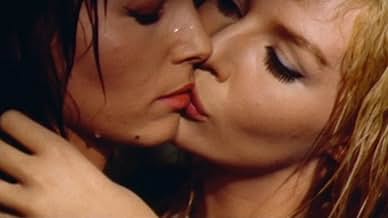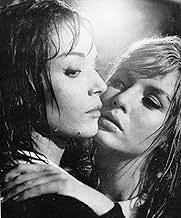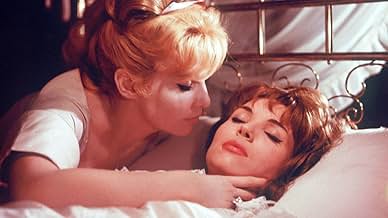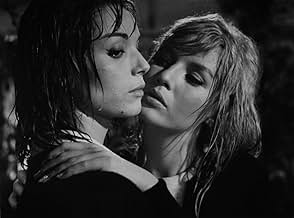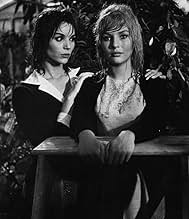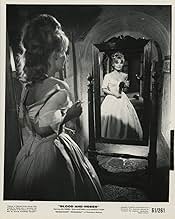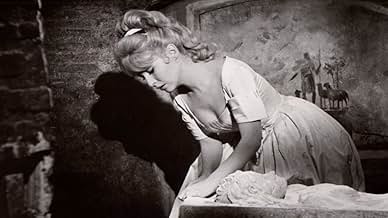IMDb RATING
6.5/10
1.6K
YOUR RATING
A young heiress - jealous of her cousin's engagement to another woman - becomes obsessed with the legend of a vampire ancestor, who supposedly murdered the young brides of the man she loved.A young heiress - jealous of her cousin's engagement to another woman - becomes obsessed with the legend of a vampire ancestor, who supposedly murdered the young brides of the man she loved.A young heiress - jealous of her cousin's engagement to another woman - becomes obsessed with the legend of a vampire ancestor, who supposedly murdered the young brides of the man she loved.
Annette Stroyberg
- Carmilla
- (as Annette Vadim)
René-Jean Chauffard
- Dr. Verari
- (as R.J. Chauffard)
Gabriella Farinon
- Lisa
- (as Gaby Farinon)
Edith Peters
- The Cook
- (as Edith Arlene Peters Catalano)
Nathalie Lafaurie
- Marie
- (as Nathalie LaFaurie)
Carmilla Stroyberg
- Martha
- (as Camilla Stroyberg)
Giovanni Di Benedetto
- Police Marshal
- (uncredited)
Renato Speziali
- Guido Naldi
- (uncredited)
Roger Vadim
- Passenger in the Plane
- (uncredited)
Featured reviews
An art house horror movie. Probably missed by horror fans, the film depicts a vampiress as romantic. The music by Jean Prodromidès and the cinematography by Claude Renoir certainly add to the romantic feeling throughout. A Harlequin horror film? Even the long shots in this film have a grace seldom seen. It often looks as if one is viewing and Impressionistic painting.
Carmilla (Annette Vadim) visits an abbey where the vampiress is buried and we see an immediate change in her mood. Was she possessed? It isn't clear.
Don't look for blood and guts or lesbian scenes. Everything happens off screen, even in the original version. But, it was a beautiful love story.
Carmilla (Annette Vadim) visits an abbey where the vampiress is buried and we see an immediate change in her mood. Was she possessed? It isn't clear.
Don't look for blood and guts or lesbian scenes. Everything happens off screen, even in the original version. But, it was a beautiful love story.
I saw this film a long time ago in the television. I can still remember the atmosphere and gentle horror that permeate the film. "Et mourir de plaisir" is based on "Carmilla", an horror tale written by Sheridan Le Fanu. I had already read the book as a child and had liked it very much. Later on I saw this film on television and I was deeply impressed - the atmosphere, the castle and landscape surrounding it, the two girlfriends running together and laughing (one of them will die because the other one is in reality a vampire), beautiful flowers ... weave together a delicate tapestry.
Contrary to the Hammer film "The Vampire Lovers" in which the girls relationship is explored very briefly and superficially, "Et Mourir de Plaisir" shows in more detail the delicate love story between two girls lived until death did them part.
I don't remember so well the film after such a long time, but some images remained with me, and those images dictate the words I'm writing now.
Contrary to the Hammer film "The Vampire Lovers" in which the girls relationship is explored very briefly and superficially, "Et Mourir de Plaisir" shows in more detail the delicate love story between two girls lived until death did them part.
I don't remember so well the film after such a long time, but some images remained with me, and those images dictate the words I'm writing now.
Time is 1960. On a jet, a man tells his friends a story about an inexplicable medical mystery that happened in Italy. Count Leopoldo Karnstein (Ferrer) is making preparations for a masked ball to celebrate his wedding to Georgia Monteverdi (Martinelli). His cousin, Carmilla Karnstein (Vadim) is in love with Leopoldo, and jealous of Georgia. The night of the ball, Carmilla wants to be alone and wanders the estate. Odd events follow.
Director Vadim seems more interested in following the erotic possibilities afforded by vampirism than by following vampire folklore. Ferrer is good as Leopoldo, who treats the whole story of his family's vampirism as a joke, until it's too late. Martinelli is fine as Georgia, who's the imperiled Gothic heroine in a modern setting. Annette Vadim is very good as Carmilla, who at first doesn't know what's happening to her, and then thinks she's possessed by an ancestor.
The photography is by Claude Renoir, and his playing with colors, light, and shadows alone make the film worth checking out.
Movie is worth seeing because of the dream-like tone it sets, early on, and for Renoir's stunning photography.
Director Vadim seems more interested in following the erotic possibilities afforded by vampirism than by following vampire folklore. Ferrer is good as Leopoldo, who treats the whole story of his family's vampirism as a joke, until it's too late. Martinelli is fine as Georgia, who's the imperiled Gothic heroine in a modern setting. Annette Vadim is very good as Carmilla, who at first doesn't know what's happening to her, and then thinks she's possessed by an ancestor.
The photography is by Claude Renoir, and his playing with colors, light, and shadows alone make the film worth checking out.
Movie is worth seeing because of the dream-like tone it sets, early on, and for Renoir's stunning photography.
This film has three outstanding features: The spectacular location, Hadrian's Villa, Claude Renoir's ravishing color and b&w cinematography, and an exquisite score featuring the rarely-used Irish harp. Vadim's direction fails to make the most of these elements, or the story, alas, but Annette Stroyberg and Elsa Martinelli are both interesting. It's above average for Vadim.
I don't know where the other poster got the idea that Stroyberg's first name was Carmilla. She did sometimes go by her married name, Vadim.
I don't know where the other poster got the idea that Stroyberg's first name was Carmilla. She did sometimes go by her married name, Vadim.
I'm mad about this film...might just be my favorite vampire film of all. It's not straight LeFanu, but it has an elegiac air that is. Doing LeFanu 'straight'--as in VAMPIRE LOVERS-- does not necessarily make for a better film as Hammer proved.
When I first saw B&R 15 years ago, I was disappointed because I wanted it to be a direct telling of the source material. Later, I saw the film, again, and it seared in to my consciousness. For no explicable reason, it suddenly "made sense" and "glammed" me; and, in particular, Annette Stroyberg's performance suddenly "clicked in." The combination of her detachment, passivity, out bursts of passion, child-like felicity, and, of course, beauty recall her literary namesake. Her profound sorrow and knowledge of being pushed aside from all that she loves--not just Leopoldo but her whole life, really--is heart-rending.
Vadim's Carmilla is always described as "jealous" or "bitter," though I don't see that. I do see deep disappointment and despair. It's refreshing, too, to see two women, rivals for one man's affection, treat each other so civilly, so kindly. Worse, Carmilla is slowly ostracized from people that she has grown up with and loved all because of her love of Leopoldo and, then, Georgia. Top that off with being possessed by a vampire, and I think dismissing her as "jealous" or "bitter" is a bit heavy-handed and easy.
I'm not quite sure why this film is considered "exploitive"--was Vadim "exploiting" Annette and his divorce from BB? Was LeFanu's "Carmilla" exploitive? It actually had far more explicit descriptions of Carmilla's breast-centric vampirism of young woman, but I don't recall the novella ever being described as "exploitive."
There are a couple of jarring moments in the film that don't sit right with me, for instance, Carmilla and Leopold doing the comic piano duet about fishing, and some parts of the celebrated "dream sequence"--just too "art house," even Bergman-esquire, and certainly screaming Cocteau.
But, in the end, the film is enchanting, ravishing, and harrowing. As others have noted, the score is exquisite and sets just the right tone, and makes me think of "pavane" and "dead princess" at the same time. Definitely in my top 10.
Just hoping that the delay in releasing BLOOD AND ROSES on DVD has to do with a pains- taking restoration and accumulation of extras on Paramount's part--this film is long overdue on DVD.
When I first saw B&R 15 years ago, I was disappointed because I wanted it to be a direct telling of the source material. Later, I saw the film, again, and it seared in to my consciousness. For no explicable reason, it suddenly "made sense" and "glammed" me; and, in particular, Annette Stroyberg's performance suddenly "clicked in." The combination of her detachment, passivity, out bursts of passion, child-like felicity, and, of course, beauty recall her literary namesake. Her profound sorrow and knowledge of being pushed aside from all that she loves--not just Leopoldo but her whole life, really--is heart-rending.
Vadim's Carmilla is always described as "jealous" or "bitter," though I don't see that. I do see deep disappointment and despair. It's refreshing, too, to see two women, rivals for one man's affection, treat each other so civilly, so kindly. Worse, Carmilla is slowly ostracized from people that she has grown up with and loved all because of her love of Leopoldo and, then, Georgia. Top that off with being possessed by a vampire, and I think dismissing her as "jealous" or "bitter" is a bit heavy-handed and easy.
I'm not quite sure why this film is considered "exploitive"--was Vadim "exploiting" Annette and his divorce from BB? Was LeFanu's "Carmilla" exploitive? It actually had far more explicit descriptions of Carmilla's breast-centric vampirism of young woman, but I don't recall the novella ever being described as "exploitive."
There are a couple of jarring moments in the film that don't sit right with me, for instance, Carmilla and Leopold doing the comic piano duet about fishing, and some parts of the celebrated "dream sequence"--just too "art house," even Bergman-esquire, and certainly screaming Cocteau.
But, in the end, the film is enchanting, ravishing, and harrowing. As others have noted, the score is exquisite and sets just the right tone, and makes me think of "pavane" and "dead princess" at the same time. Definitely in my top 10.
Just hoping that the delay in releasing BLOOD AND ROSES on DVD has to do with a pains- taking restoration and accumulation of extras on Paramount's part--this film is long overdue on DVD.
Did you know
- TriviaChristopher Lee was originally considered for the role of Count Karnestein (probably to make the film marketable for fans of his Hammer vampire films) but the part eventually went to his friend Mel Ferrer.
- GoofsIn three shots from the same scene, the bloodstain on Carmilla's dress moves from the right to the left side, then back to the right side again.
- Alternate versionsThe US version of the film eliminates both the original epilogue and prologue as the Professor tells the story of Carmilla, as well as almost every scene with Martha and Marie. That version also includes a totally different ending on which Georgia herself becomes a vampire, as well as an all new voice over narration by Millarca herself.
- ConnectionsFeatured in Aweful Movies with Deadly Earnest: Blood and Roses (1975)
- How long is Blood and Roses?Powered by Alexa
Details
- Runtime
- 1h 14m(74 min)
- Aspect ratio
- 2.35 : 1
Contribute to this page
Suggest an edit or add missing content

